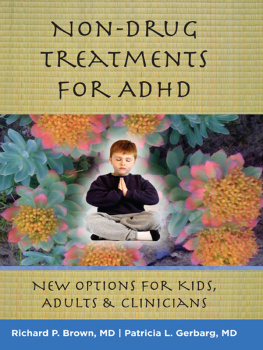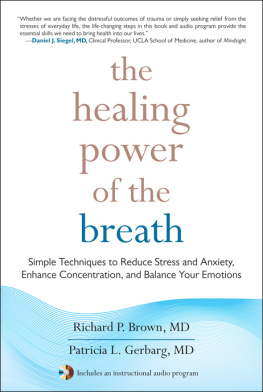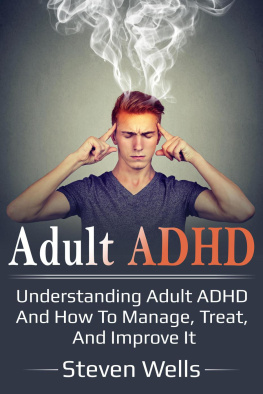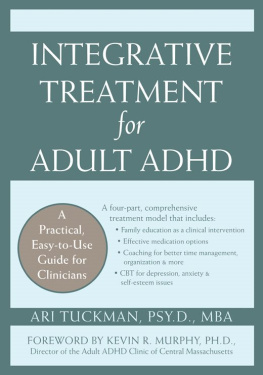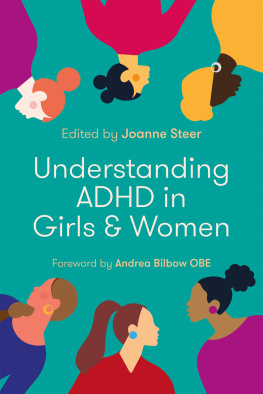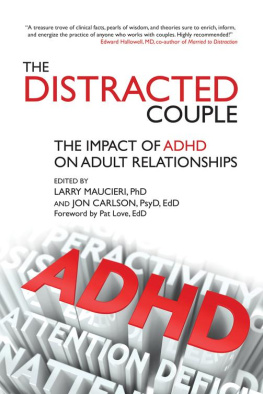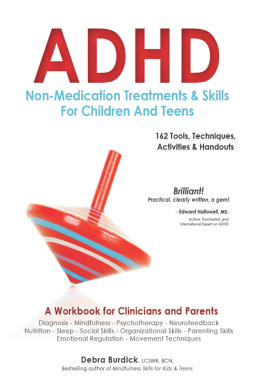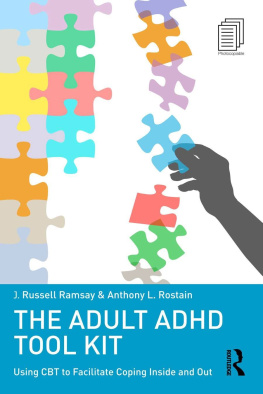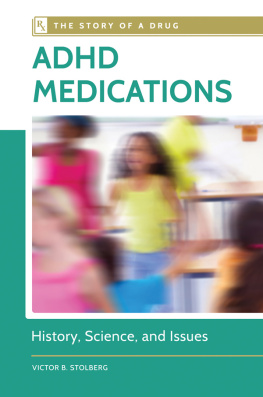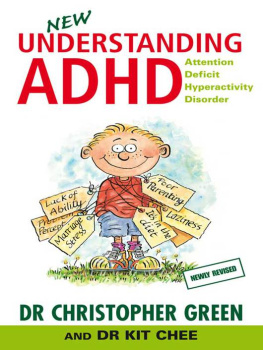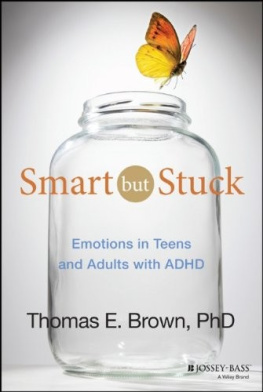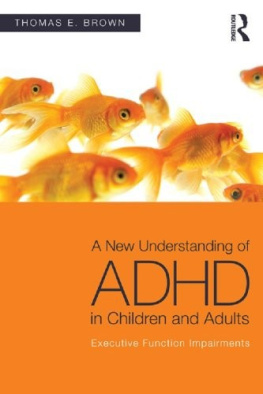Non-Drug Treatments for ADHD
NON-DRUG TREATMENTS for ADHD
New Options for Kids, Adults & Clinicians
RICHARD P. BROWN, MD
PATRICIA L. GERBARG, MD

W. W. NORTON & COMPANY
New York London
Cover photograph, courtesy of Petra Illig, MD President of Alaska Rhodiola Products Cooperative, shows 2-year old Rhodiola rosea growing in Bethel, Alaska on the YukonKoskoquim River delta. www.alaskarhodiolaproducts.com
Copyright 2012 by Richard P. Brown, MD, and Patricia L. Gerbarg, MD
All rights reserved
Printed in the United States of America
First Edition
For information about permission to reproduce selections from this book, write to Permissions, W. W. Norton & Company, Inc., 500 Fifth Avenue, New York, NY 10110
For information about special discounts for bulk purchases, please contact W. W. Norton Special Sales at or 800-233-4830
Manufacturing by Quad Graphics, Fairfield
Book design by Carole Desnoes
Production manager: Leeann Graham
Library of Congress Cataloging-in-Publication Data
Brown, Richard P.
Non-drug treatments for ADHD : new options for kids, adults, and clinicians / Richard P. Brown, Patricia L. Gerbarg. 1st ed.
p. ; cm.
Includes bibliographical references and index.
ISBN 978-0-393-70622-2 (hardcover)
1. Attention-deficit hyperactivity disorderDiet therapy. I. Gerbarg, Patricia L. II. Title. [DNLM: 1. Attention Deficit Disorder with Hyperactivitytherapy.
2. Complementary Therapiesmethods. 3. Diet Therapymethods. WS 350.8.A8]
RJ506.H9B764 2012
616.858906854dc22
2011010952
ISBN: 978-0-393-70622-2
W. W. Norton & Company, Inc., 500 Fifth Avenue, New York, N.Y. 10110
www.wwnorton.com
W. W. Norton & Company Ltd., Castle House, 75/76 Wells Street, London W1T 3QT
1 2 3 4 5 6 7 8 9 0
To our family and to yours.
CONTENTS
ACKNOWLEDGEMENTS
M any people contributed to the writing of this bookprofessional colleagues, patients, consumer advocates, and people living with attention-deficit hyperactivity disorder (ADHD). We deeply appreciate those who allowed us to present material from their own treatment histories in the spirit of helping others to better understand and manage this multifaceted condition.
We set out to write a book that would not only be useful to clinicians and the general public, but one that would also be reader-friendly for those with ADHD. Writing in a manner that presents important scientific and medical information without being intimidating, dry, or boring was our challenge. To the extent that we succeeded, we are indebted to our manuscript readers and editors, in particular to Leslie Andrade, an elementary school teacher who deals with ADHD all day long because her husband, one of their children, and many of her students suffer from it.
We are especially grateful to Joy Bennett, IYT 500, founder of Joyful Breath Yoga Therapy, for describing the program she developed in working with boys with severe ADHD and co-existing conditions. Kim Sutherland, MEd, also shared her experiences as a special education teacher for children with severe ADHD.
We wish to thank the following colleagues who generously shared their expertise with us. Thanks to Dr. Stephen Larsen, Director of the Stone Mountain Center and Professor Emeritus, State University of New York, for reviewing and sharing his case material. Dr. Leslie Sherlin, Chief Science Officer at Neurotopia, Inc., past president of the International Society for Neurofeedback, and Adjunct Assistant Professor at Southwest College of Naturopathic Medicine, was instrumental in assuring the accuracy of the section on neurotherapy. Dr. Margaret D. Weiss, Clinic Head of the Provincial ADHD Program and Clinical Professor at the University of British Columbia, reviewed the manuscript and gave permission for us to publish some of the ADHD test measures she developed. Dr. Sat Bir Singh Khalsa, Assistant Professor of Medicine at Harvard Medical School, shared his current research on yoga in schools. We also appreciate the assistance of Dr. Charles Silberstein, attending psychiatrist at Marthas Vineyard Hospital; Dr. Pankaj Naram, Ayurvedic physician; Dr. Rollin McCraty, Director of Research, Institute of HeartMath; Dr. Larry Hirshberg, Director of the NeuroDevelopment Center and Clinical Assistant Professor at Brown University Medical Center; Naomi Gerbarg, MSW; and Judith Carrington, founder of Mental Health Resources.
Special thanks go to Dr. Petra Illeg, founder of and president of the not-for-profit Alaska Rhodiola Products Farmers Cooperative, who provided the photograph of Rhodiola rosea, a medicinal herb, that appears on the cover of our book.
This book would not have been possible without the support of our publisher, W. W. Norton & Company, particularly our editor, Andrea Costella Dawson, who was adept at helping navigate the book through the editorial and publication process while respecting the views of the authors. Her feedback, advice, encouragement, and responsiveness were invaluable. We also appreciate the work and support of Vani Kannan, associate managing editor, as well as the art department for working with us on the book cover.
Thanks are also due to our book shepherd, Wendy Jane Carrel, whose expertise and encouragement helped to shape our book and bring it to the attention of our readers.
We also want to thank one of our most candid critics, our son, David Braslow, MEd. David has always been a math guy who hopes to improve the way math is taught in public schools. What we didnt realize was that during his liberal arts education at Brown University he also became a skilled writer. We were the proud recipients of comments such as, How can this be? Why does this matter? This is confusing. If youre going to confuse me, at least tell me why it is important to be confused. As you read this book, you have our quixotic David to thank for insisting that we present material in a logical progression and for making us rewrite the unreadable prose.
Lastly, we wish to thank you, our readers, in advance for your interest in our work. We welcome your comments and questions; the notes sent to our HaveaHealthyMind.com Web site by those who read our last book, How to Use Herbs, Nutrients, and Yoga in Mental Health Care, assured us that we had succeeded in reaching beyond the walls of our offices and lecture halls to bring knowledge about the possibilities of integrative treatments to a global readership.
PREFACE
T he impetus for this book came from the many questions we have been asked by people living with attention-deficit disorder (ADD) and attention-deficit/hyperactivity disorder (ADHD), and by the clinicians trying to help them overcome the multitude of challenges they face every day at school, in the workplace, and at home. We are both psychiatrists with over thirty years of experience. In addition, Dr. Brown is a psychopharmacologist, an herbal specialist, and a certified teacher of Akido (4th Dan), yoga, qigong, and meditation. We both practice and teach integrative approaches that combine the best of standard treatments with herbs, nutrients, cognitive enhancers, mind-body practices, and brain stimulation. Many talented clinicians, yoga therapists, and teachers have found creative methods to help those who struggle with attentional problems, and we present their work throughout this book. We would like to tell you a little more about two people in particular whose ideas enriched this book: Leslie Andrade and Joy Bennett.
In preparing this book, we wanted to be certain to address the questions that are important to people dealing with ADHD. The first three chapters provide information about diagnostic issues and the scientific foundation for understanding the known causes of ADHD as well as how different treatments may work. I (Dr. Gerbarg) was fortunate to meet Leslie Andrade, an elementary school teacher, in August, 2010 at the Brown University Summer Writers Workshop. The first session of the creative nonfiction group revealed that Leslie and I were both working on books about ADHD, but from different points of view. Leslies book was based on her experiences living with a husband and a child with ADHD and dealing with ADHD in her students. It became evident that Leslies irresistible humor and indomitable spirit had gotten her through the many crises that arise when raising and advocating for children with ADHD. Eager to learn about non-drug treatments that might help her family, Leslie agreed to critique a draft of our book. She pointed out what would make the text easier or harder for readers with ADHD to comprehend. Her observations were spot on and she sent just what we needed, a barrage of questions. Leslie also agreed to describe in her own words a little about her experience as the parent of a child with ADHD.

